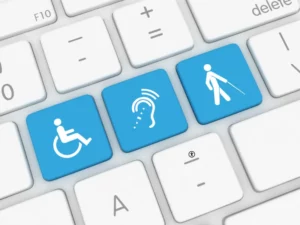
You’ve worked hard on your website—now imagine it being attacked by cyber threats. Did you know that small businesses can face huge costs from security incidents, sometimes reaching over half a million dollars? Our guide is here to show you the ropes of web protection, ensuring your site stays safe and secure without breaking a sweat.
Get ready to lock down your digital fortress!
Understanding Website Security: Why is it Important?
Jumping from an overview of cyber threats to a deeper dive, let’s talk about website security. It keeps your online business safe. Hackers work day and night to steal data and disrupt services.
A secure website protects customer information and ensures trust.
Having strong website security stops hackers from taking control of your site. Attacks cost businesses money and reputation — two things you can’t afford to lose. So it’s crucial for protecting both profits and credibility in the digital world.
Typical Threats to Website Security
You’re putting your heart and soul into your business’s website—it’s the digital storefront to your success, after all. But lurking in the shadows are cyber threats that could undermine everything you’ve worked for; it’s essential to recognize these adversaries.
From cunning data thieves poised to snatch sensitive information to relentless attacks that can bring your site to its knees, understanding what you’re up against is the first step in fortifying your online presence.
Managing your website’s downtime effectively is important as well.
Let’s dive into this murky world together and uncover the common hazards threatening to breach our virtual bastions.
Information Breach
Hackers love to steal sensitive information. If they break into your site, they might take customer data, credit card numbers, or even log-in details. This is a data breach.
It can happen to anyone and costs a lot of money to fix – on average $200,000 for businesses big and small.
Protect your clients’ privacy with strong security measures. Use encryption to turn sensitive data into secret codes. Change passwords often and make sure they are tough to guess. Remember that a breach can stay hidden for 280 days before you spot it! Act fast and keep your website safe from these attacks.
Denial of Service (DoS)
It overwhelms your site with traffic until it collapses under the pressure.
Protecting against these incidents is crucial for keeping your digital doors open. Services like Cloudflare security use web application firewalls (WAF) to monitor incoming traffic and fend off suspicious activity.
SSL certificates add an extra layer by securing connections between servers and browsers, making DoS attacks much harder to carry out.
Remember, staying vigilant and employing strong defenses keeps your online presence safe and reliable.
Pilfered Passwords
Hackers love stolen passwords. They use them to sneak into your website and cause trouble. Imagine leaving your house keys at a coffee shop. Someone finds them and enters your home without you knowing.
That’s what happens with stolen passwords, but for your online business.
You need armor against these thieves—and that’s where multi-factor authentication (MFA) comes in handy. It adds an extra step for anyone logging into your site. Even if someone swipes a password, they can’t get in without this second check.
Think of MFA like a double lock on your door; it’s tougher to break through and keeps the bad guys out of where they don’t belong.
Steps to Secure Your Website
Ensure that software and security patches are consistently kept up-to-date.
Always update your website software and security patches. Hackers love old, unpatched software because it’s easy for them to break in. Think of updates as a shield; they block bad guys from getting into your site.
For these reasons, all of our clients that have our website care plan, always have their website software updated once/week.
You wouldn’t leave your front door open, so don’t leave your website open to attacks! Set up alerts or schedule regular check-ins to make sure everything is fresh and secure.
Think about the cost of a cyberattack on your business—it can be huge. Staying updated keeps those costs down by preventing attacks before they happen. Use security plugins if you have WordPress, and always download the latest versions of any platform or script you use.
This way, you’re taking strong steps toward protecting your online presence against threats lurking around every digital corner!
Implement SSL and HTTPS
Just as updating software is crucial, so is establishing a secure website foundation with SSL and HTTPS. Get an SSL certificate to encrypt the connection between your site and its visitors, keeping sensitive data safe.
This digital handshake ensures that all transferred information remains out of reach from prying eyes.
Your URL will now start with “https://” showing users the gold lock symbol, signaling security and trustworthiness. It’s not just about looks; Google favors secure sites in search rankings.
With Let’s Encrypt offering free certificates, there’s no excuse. Transition smoothly to this new standard of web security and watch your customers surf with confidence on your protected site.
Secure sockets layer (SSL) isn’t a luxury; it’s a necessity for safeguarding financial records and medical details online – make the switch today!
Mandate intricate passwords and regular changes
Make sure your passwords are tough nuts to crack! Use a mix of letters, numbers, and symbols to create complex passwords. This makes them harder for hackers to guess or attack with their tools.
Change these passwords often, too—don’t wait for a breach to happen. Think of it like changing locks regularly; it keeps intruders out.
Encourage everyone on your team to update their passwords every few months. Passwords are the keys to your online kingdom—treat them with care! With cyberattacks increasing daily, strong passwords act as a vital shield for your website’s security.
Limit Administrative Privileges
Complex passwords are a great start, but don’t stop there. Tighten your website’s security by restricting administrative privileges. Only give admin access to those who truly need it.
Think of it like a VIP list for your site’s backstage – not everyone needs to be on it. Those with admin rights can make major changes, so keep that group small.
By limiting these powers, you reduce the risk of an insider accidentally harming your site or a hacker gaining control if they crack a password. You can set different levels of access for different people.
This way, team members only have the permissions necessary to do their jobs. It’s about protecting your digital kingdom with smart access rules while keeping things running smoothly.
Backup Your Files
Backup your files regularly to save yourself from big troubles. Cyber incidents can hit hard, costing you from $826 to more than half a million dollars! With automatic backups, you’ll be one step ahead.
You can quickly restore your website if anything goes wrong.
Imagine losing all your customer data and the work you’ve put into your site. That’s why it’s essential to have a backup system in place, as we do daily with all of our website maintenance packages. You’ll protect not just files but also peace of mind.
Think of it as an insurance policy for your online presence—one that will help keep your business running smoothly no matter what happens.
Employ a Web Application Firewall (WAF)
Protect your site with a Web Application Firewall (WAF). This is like a shield that stops hackers before they can do harm. It looks at all the traffic coming to your website and blocks bad stuff, such as hacking attempts or harmful data.
With a WAF, you guard against threats in real-time.
Your web applications are safe when you use a WAF. It filters out attacks like SQL injections and cross-site scripting while letting good traffic through. Think of it as a bouncer for your website—it only lets the right visitors in.
Plus, setting it up is usually easy and keeps security tight without slowing down your site. Make sure to choose one that fits well with your website’s needs!
Deploy Multi-factor Authentication (MFA)
Just as a Web Application Firewall guards the gates to your website, Multi-factor Authentication (MFA) ensures that only the right people have the keys. Think of MFA as a second line of defense.
If someone steals or guesses your password, they still can’t get in without this additional security step. You might use a code from your phone, an answer to a personal question or even your fingerprint.
Setting up MFA is simple and it brings big benefits for protecting your site. It’s like having an extra bolt on your door—an added reassurance that hackers can’t easily break through.
Encourage everyone who has access to sensitive areas of your website to use MFA. It’s one small change that makes a huge difference in keeping cyber threats at bay.
Best Website Security Tools
Let’s Encrypt - SSL Certificate
Let’s Encrypt hands out free SSL certificates. These certificates are vital for your website security. They build a secure, encrypted link between your site and a visitor’s browser.
This encryption keeps hackers away from sensitive data.
Getting an SSL certificate from Let’s Encrypt is easy and cost-free. Secure connections help protect credit card numbers, passwords, and personal info flowing to and from your site.
With Let’s Encrypt, even small business owners can give their users peace of mind at no extra charge. Make sure to add an SSL certificate to your website security checklist today!
Cloudflare - Web Application Firewall
Cloudflare acts like a shield for your website. It checks all the visitors coming to your site, making sure they’re safe. Imagine it as a bouncer at the door of your online business, stopping troublemakers before they can cause harm.
This firewall uses smart technology that learns from attacks on millions of other sites, growing smarter every day.
With Cloudflare’s Web Application Firewall (WAF), you get peace of mind knowing that even the sneakiest cyber threats are being watched and blocked. You won’t have to stress about hackers or bad bots—Cloudflare handles them all for you.
We believe that Cloudflare should be included with every WordPress Website Care Plan!
Plus, it’s constantly updating its defenses from data gathered across 25 million websites, ensuring top-notch security for yours.
CDN - Global Content Delivery Network
Just as a strong firewall shields your website, CDN acts like a global delivery van for your content. It spreads your site’s data across servers around the world. When someone visits your site, A CDN ensures they get the information from the closest server.
This means pages load faster and there’s less strain on just one server — it’s teamwork at its best.
CDN not only speeds up access to your site but also comes with built-in security features. It can detect and block threats before they reach you, helping to keep hackers away.
Quick page loads and tough security – that’s a win-win for any website owner!
Conclusion
Secure your website like it’s your business’s front door. Take action with the steps we’ve covered, and make use of powerful web security tools. Remember, website reliability not only protects you but also builds brand trust with your customers
Keep learning and stay ahead of threats – your business deserves it!

Founder & CEO
Tired of battling web complexities?
Get some Peace of Mind and leave website worries to us.
Learn more




